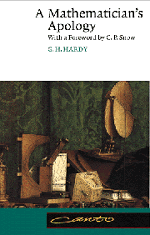Summary
A MATHEMATICIAN, like a painter or a poet, is a maker of patterns. If his patterns are more permanent than theirs, it is because they are made with ideas. A painter makes patterns with shapes and colours, a poet with words. A painting may embody an ‘idea’, but the idea is usually commonplace and unimportant. In poetry, ideas count for a good deal more; but, as Housman insisted, the importance of ideas in poetry is habitually exaggerated: ‘I cannot satisfy myself that there are any such things as poetical ideas…. Poetry is not the thing said but a way of saying it.’
Not all the water in the rough rude sea Can wash the balm from an anointed King.
Could lines be better, and could ideas be at once more trite and more false? The poverty of the ideas seems hardly to affect the beauty of the verbal pattern. A mathematician, on the other hand, has no material to work with but ideas, and so his patterns are likely to last longer, since ideas wear less with time than words.
The mathematician's patterns, like the painter's or the poet's, must be beautiful; the ideas, like the colours or the words, must fit together in a harmonious way. Beauty is the first test: there is no permanent place in the world for ugly mathematics. And here I must deal with a misconception which is still widespread (though probably much less so now than it was twenty years ago), what Whitehead has called the ‘ literary superstition’ that love of and aesthetic appreciation of mathematics is ‘a monomania confined to a few eccentrics in each generation’.
- Type
- Chapter
- Information
- A Mathematician's Apology , pp. 84 - 88Publisher: Cambridge University PressPrint publication year: 1992

